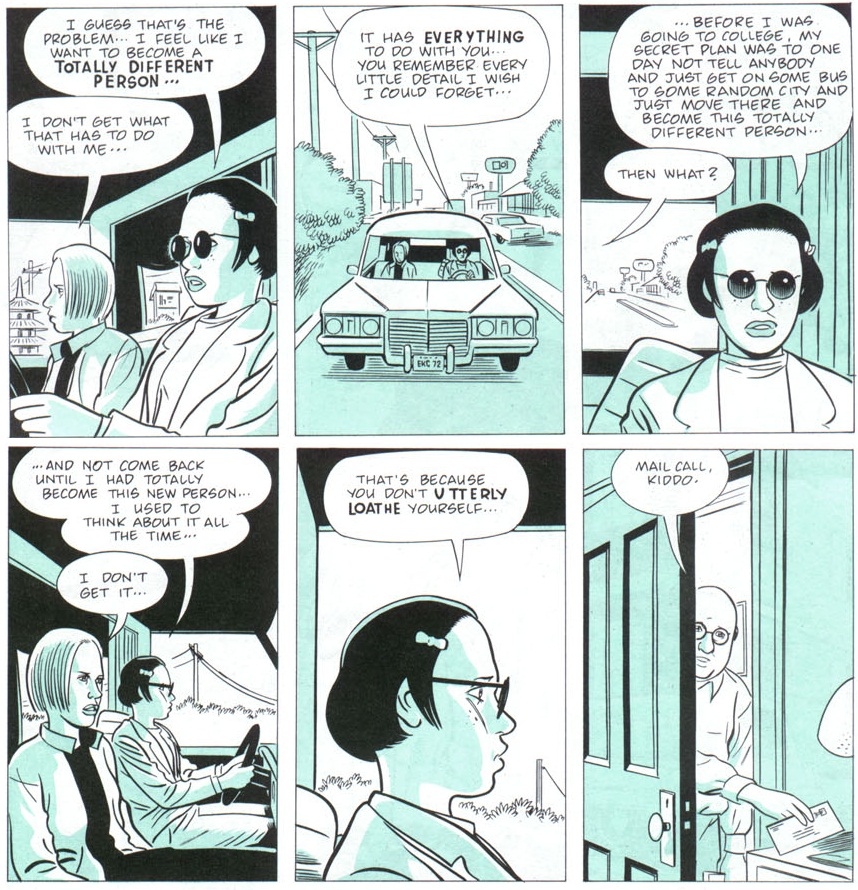 The problem with being relatively new to a medium is catching up on all the 'Cannon'. I think Ghost World is quite comfortably in that zone. It tells the story of two off-beat, intelligent and acidly sarcastic high-school friends who are languishing at home, not really knowing what to do next in that awkward phase where it feels like your childhood is over, but your exciting, exotic adult life seems kind of slow to get going. Sometimes it's too many options that freaks a person out, sometimes it's the lack of any options at all and sometimes it's the very idea of an important decision.
The problem with being relatively new to a medium is catching up on all the 'Cannon'. I think Ghost World is quite comfortably in that zone. It tells the story of two off-beat, intelligent and acidly sarcastic high-school friends who are languishing at home, not really knowing what to do next in that awkward phase where it feels like your childhood is over, but your exciting, exotic adult life seems kind of slow to get going. Sometimes it's too many options that freaks a person out, sometimes it's the lack of any options at all and sometimes it's the very idea of an important decision.Enid Coleslaw is cynical and impulsive and best friend Rebecca Doppelmeyer is more mainstream; blonde and responsible, with less anger and resentment. Together they spend their empty days wandering around their anonymous American town full of strip malls, burger joints and record stores, slagging off popular culture and making fun of the people they encounter while contemplating what they will do with the rest of their lives. As the story begins, they are inseparable; they know all of each other's embarrassing stories, crushes and sexual encounters, all of each other's secrets and histories. They speak every day and depend on each other for support with pretty much everything. There's something incredibly self indulgent about them, a lack of attention to consequences and effects. It's a last fling with youth, and it's very bittersweet.
A love triangle of sorts emerges between the girls and their mutual friend Josh, an easygoing lad whom they enjoy teasing and sparring with. They both seem casually interested in him, but also playfully entertain the notion that they might be gay. For fun, if nothing else. Themes of identity are pretty important to the book. The idea that identity is flexible (Enid goes through many, many looks and claims to loathe herself) and that it can evolve over time.
As the story unfolds Enid and Rebecca start to develop tensions over boys, ambitions and life in general and they drift apart. Enid thinks perhaps she'll go to college. Becky isn't sure. Everything that once seemed solid doesn't look so stable anymore. The friends struggle to build identities separate of one another, until the day that it finally happens and the intimacy they once shared is gone.
The artwork is a really classic black, white and turquoise-y green that gives it a really stark appearance, but really helps to anonymise the town, to characterise the identity swapping Enid and create a really mundane world. It's not fussy and it allows the reader to focus on the characters and their lives.
It would be quite easy to dismiss Ghost World as being morbid or bitter, but I think there's something pretty universal about it that appeals, and not just to the ennui-leaden. It's about change, really. How inevitable change is and how confusing it is when it happens. Everybody has that friend that they thought they would be friends with forever, but who drifts off into obscurity, and that's really relatable. It's not an uplifting read, but it's clear that there's a future for them both, and potential. And that's about the best one can hope for.


No comments:
Post a Comment